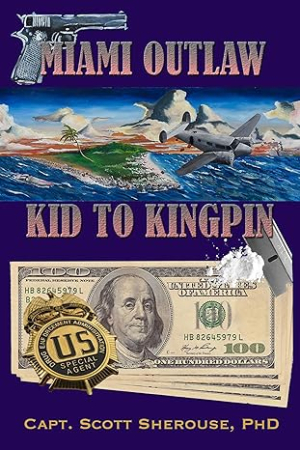
Miami Outlaw
Kid to Kingpin
Miami Outlaw is a ranging account of countercultural activities within the criminal underworld.
Scott Sherouse’s thorough memoir Miami Outlaw covers the exploits of a Florida drug-running inner circle.
Tying Sherouse’s experiences into a long line of historical smuggling, including during Prohibition and across black markets, the book begins with vignettes from the drug trade’s past in South Florida and the Bahamas. There’s a countercultural element to these accounts, as with notes of how enslaved people and others who were marginalized created their own societies beyond the dominant forces of the colonizers. Later, other underdogs and immigrant communities, finding the system stacked against them, also found the illegal trade to be an outlet.
Indeed, the book is packed with celebrations of fellow underdogs finding their way in the underworld across time. At times, these forays overwhelm Sherouse’s own story, though. References to sports figures who were involved in drugs also strike a discursive note.
Better centered is the sense that “society is losing respect for laws and … in the officials tasked with enforcing the laws,” with the text pointing out that the government officials tasked with stopping illegal trades monetarily benefit from the same trades they admonish; news articles are cited to support this. In counter to such institutional corruption, the book makes note of the unwritten rules that do govern drug-dealing.
At its most immersive when it’s covering Sherouse and his crew, the lengthy book revels in reminiscences of his friendships and partnerships within the drug-dealing world. He writes about the death of the father of his best friend–cum–business partner Alex and how it solidified Alex’s determination to succeed and buoy his family’s finances. Sherouse was also motivated to capitalize on the drug trade out of a sense of commitment to Alex’s welfare. Sherouse’s own father is fleshed out with admiration as well, though his speeches are quoted in excess: When fishing, partying with friends, and racing cars and boats, Sherouse kept his father’s legacy in mind. Women, conversely, are not fleshed out well in these accounts; instead, they are often treated as mere sex objects.
The prose is thick with enlivening details, as of equipment used during nighttime, high-stakes deals. Slang from the trade peppers the book and is also vivifying. Anecdotal and sometimes rhetorical, the text moves through tense action scenes in an immersive manner. Sherouse’s gang’s biggest drug deals conclude the account, with anticipation growing related to his entanglements with law enforcement.
Indeed, as cultural tensions mounted, the crew undertook increasing risks. There are memories of nefarious law enforcement agents clashing with ruthless cartel heads near the book’s cliffhanger conclusion, which shows that resistance to the war on drugs continues. However, the presentation is undermined by blurry images, ads for the book inserted between chapters, inconsistency in the chapters’ openings, and typographical and grammatical errors.
Situating its story within cultural and historical context, the exhaustive memoir Miami Outlaw is about how those in the underworld confront the war on drugs, in Florida and beyond.
Reviewed by
Mari Carlson
Disclosure: This article is not an endorsement, but a review. The publisher of this book provided free copies of the book and paid a small fee to have their book reviewed by a professional reviewer. Foreword Reviews and Clarion Reviews make no guarantee that the publisher will receive a positive review. Foreword Magazine, Inc. is disclosing this in accordance with the Federal Trade Commission’s 16 CFR, Part 255.
